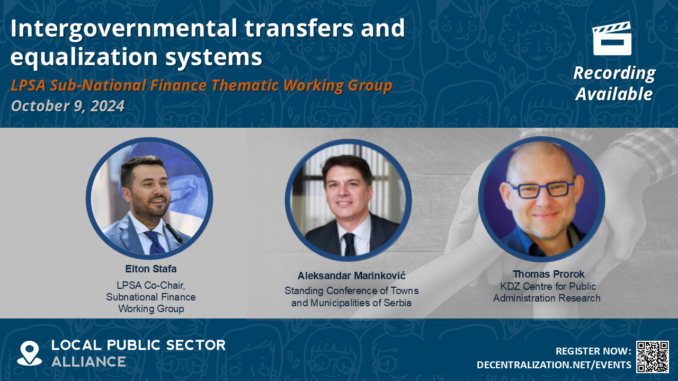
The 5th open meeting of LPSA’s Thematic Working Group on Subnational Finance took place on October 9, 2024, (9:00 EDT/ 14:00 BST/ 15:00 CEST). Moderated by Elton Stafa, NALAS Fiscal Decentralization Expert and Co-Chair of the working group, the meeting focused on the critical role of intergovernmental transfers in ensuring local governments’ financial sustainability, as they account for over half of their revenue. Various equalization systems across the region were presented, highlighting disparities in local government revenues and fiscal autonomy, particularly in Southeast Europe.
Elton Stafa, welcomed attendees and introduced the EU-funded LoGov (Local Government and the Changing Urban-Rural Interplay) Project, which explores how local governments can adapt to evolving urban-rural dynamics. He discussed the challenges and disparities in local government revenues and fiscal autonomy in Southeast Europe, noting that from 2006 to 2021, only half of the countries saw an increase in local revenues, while fiscal autonomy declined across the board. Stafa highlighted the curtailment of local governments’ tax powers and significant disparities in revenue-raising capacities between countries. He then presented various equalization systems from Albania, Slovenia, Croatia, Montenegro, Bulgaria, and North Macedonia, stressing that while the size and criteria of equalization components differ, they share a common goal: to address disparities and incentivize improved revenue collection.
Aleksandar Marinković from the Standing Conference of Towns and Municipalities of Serbia presented an overview of Serbia’s local government system and financing, focusing on the challenges faced by small and underdeveloped municipalities due to the absence of sufficient equalization grants. He highlighted that public investment in Serbia is heavily concentrated in the capital city, and there is a lack of transparency in the conditional grants provided by the central government. Marinković discussed the 2006 Law on local government financing, which aimed to establish a predictable, objective, and sustainable financial management system. This law consists of three pillars: all revenues, shared revenues, and transfers. Shared revenues primarily consist of personal income tax, with the gross wage tax being the most significant. The law also includes provisions for conditional and unconditional transfers, with unconditional transfers comprising equalization, compensatory, transitional, and general grants. He detailed the criteria for allocating general grants, which are based on factors such as population size, territorial area, number of school classes, and number of schools. Marinković also explained the transfer of funds from Serbia’s wealthiest cities, Belgrade and Novi Sad, to other municipalities. He noted a significant reduction in transfers during the economic crisis and described how political bargaining led to changes in the law. Additionally, he discussed modifications to the wage tax share, the total unconditional transfer, and the introduction of a solidarity grant. He emphasized the need for simple, transparent grant design and highlighted challenges posed by demographic shifts and formal adjustments.
During his remarks, Thomas Prorok, Managing Director of KDZ Centre for Public Administration Research in Austria, reflected on the challenges facing fiscal decentralization in Europe, particularly the ongoing decline in local governments’ fiscal autonomy, a trend evident in many countries, including Austria. He highlighted the wide variations in fiscal equalization systems across Europe, noting that Albania allocates 50% of revenues for equalization, while North Macedonia allocates only 4%, despite these countries sharing similar historical backgrounds. Prorok also underscored the complexity of fiscal systems, with some countries relying on personal income tax and others on value-added tax, citing Serbia’s personal income tax model as both admired and criticized. He emphasized that fiscal equalization systems should be as simple as possible, as excessive complexity undermines their effectiveness. Prorok pointed to Austria’s ongoing debate about implementing an output and task-oriented fiscal equalization system, a discussion that has lasted for over 20 years without resolution. Finally, he stressed the need for cross-country learning and collaboration in Europe to refine fiscal models, as many systems are still far from fully functional and in need of significant improvements.
The presentations and remarks were followed by a Q&A session during which participants raised questions regarding the challenges of data reliability and quality in equalization formulas, particularly in decentralization and conditional grants, with small countries like Albania and Moldova often lacking regularly updated, reliable data. Canada shared its experience with a constitutionally embedded federal-provincial equalization system, noting that while challenges exist, local fiscal autonomy is not declining, unlike in some European nations.
Elton Stafa concluded the meeting and announced the next open meeting of the Thematic Working Group on Subnational Finance for February 5th, 2025. A video of the meeting is available on YouTube. The links below provide access to the video segments of the different agenda items.
| Agenda Item | Contributor | Slides |
| Welcome & Introduction Overview of Local Transfer and Equalization Systems in South-East Europe | Elton Stafa Project Manager, NALAS Subnational Finance Working Group Co-Chair | View |
| The Serbia Experience: The Equalization System in Serbia | Aleksandar Marinković Standing Conference of Towns and Municipalities of Serbia | View |
| Discussant | Thomas Prorok KDZ Centre for Public Administration Research | N/A |
| Moderated Q&A | Participants Moderated by Elton Stafa | N/A |
| Closure & Preview of the Next SNF Webinar | Elton Stafa | N/A |
The next Subnational Finance webinar is scheduled on February 5th, 2025 – Register Here.
Reminder: You can join any LPSA Expert Working Group free of cost and receive reminders and updates by opting in to one or more working groups as part of your LPSA Membership registration.





